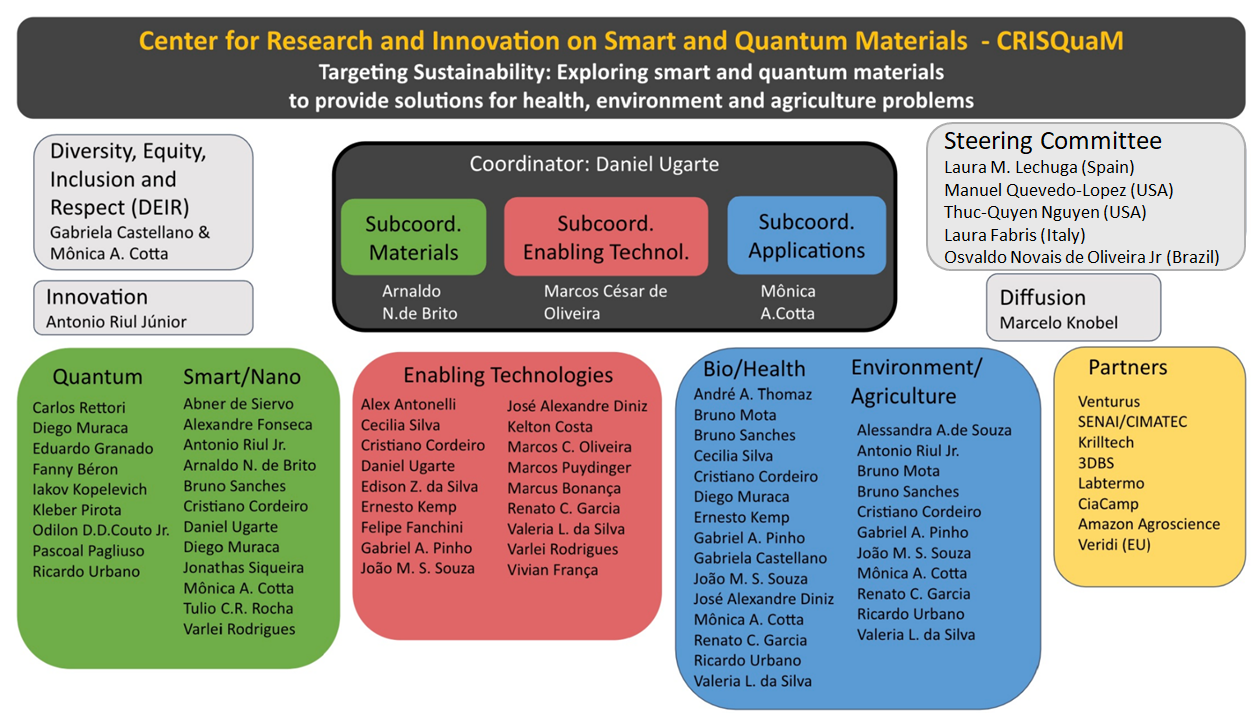BV-FAPESP: research projects supported in this Center
CRISQuaM in the Media: news about the center
CRISQuaM aims to explore the synergistic development of fundamental and applied science to create new materials with high potential for the construction of devices and sensors to address technological challenges related to sustainability, climate change, precision agriculture, ecology, and health. To achieve these goals, we have assembled an interdisciplinary and collaborative research team, integrating expertise across various scientific domains, researching novel materials with high innovation potential. By combining original synthesis methods, advanced characterization techniques, theoretical approaches, computational simulations, quantum technologies, and device construction designs, we aim to drive advances in smart and quantum materials, promoting scientific excellence and technological development. With this, we plan disruptive innovations in instrumentation—including hardware and AI-based tools—as well as in quantum technologies, biomedical devices, and signal processing, in addition to plant bionics, exploring plant-pathogen interactions. Besides research activities, we plan intensive actions in education, dissemination, and communication for the general public, as a modern society should be aware of the challenges humanity faces and how research and technology are essential for responsibly utilizing the planet's limited resources. CRISQuaM's Innovation activities are accelerated through partnerships with several companies in related technologies, many of them Brazilian. Finally, all activities of the Center are managed in accordance with diversity, equity, and inclusion goals and best practices.
The Center brings together scientists, engineers, and innovators in a collaborative effort to apply materials science and quantum technologies at the cutting edge, designing new materials and nano(bio)sensors for advanced diagnostics. The Center has a team capable of producing a wide range of (nano/micro) materials, along with precise chemical and physical characterizations using modern techniques (synchrotron, advanced microscopy, magnetotransport, magnetic resonance, optics, etc.). In addition, the team offers various options in enabling technologies, including miniaturization, processing, and additive manufacturing, as well as instrumentation, quantum sensing, and electronics development. Data analysis will employ updated approaches (numerical simulation, classical and quantum machine learning, and quantum optimization). Applications at the knowledge frontier will address urgent sustainability needs in environmental areas, precision agriculture, plant bionics, and biomedical interfaces, contributing to the development of local technologies in close partnership with the Brazilian industry.
The organization of the Center is based on three pillars — Materials, Enabling Technologies, and Applications — together with partner companies, as described in the figure below.

2025-04-09
Produced at the Engineering School (POLI-USP), the equipment generates thermal radiation similar to that of the sun. It makes it possible to test devices and technologies in the laboratory without having to rely on ideal weather conditions.
2025-04-09
While cognitive-behavioral therapy showed faster results, the effect of acceptance and commitment therapy was more lasting, shows a study conducted at the University of São Paulo with 227 volunteers.
2025-04-09
Equipment developed in Brazil by researchers at the National Telecommunications Institute combines Internet of Things devices, high-resolution cameras, and artificial intelligence algorithms to capture and identify female Aedes aegypti without harming other insects.
2025-04-09
Study carried out in Brazil’s semi-arid biome found that removing animals did not lead to significant improvements, even after three years of spontaneous soil recovery. Researchers suggest complementary measures such as green manure and strategic tree planting.
2025-04-02
Researchers from São Paulo State University and collaborators studied 50 young people with an average age of between 26 and 27. The goal was to find biomarkers that allow early detection of health changes.
2025-04-02
The study, conducted at the State University of Campinas, involved 44 people with mild cognitive impairment. After six months, the volunteers who practiced strength training showed improvements in memory and brain anatomy, while the others showed a decline in the parameters evaluated.